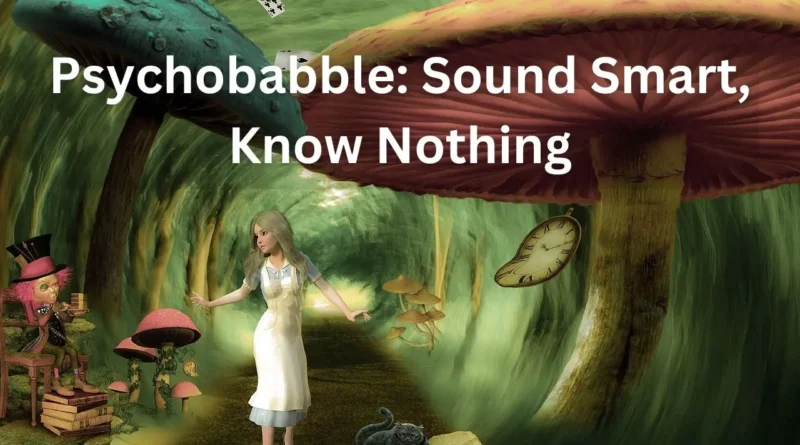Psychobabble
Table of Contents
1. Introduction
Definition of Psychobabble
“Psychobabble” is a term used to describe language that sounds like psychology but lacks real substance or scientific backing. It often involves the misuse or overuse of psychological terms, theories, and concepts in ways that are either incorrect or overly simplistic. The goal of psychobabble is typically to impress or persuade rather than to inform or educate.
The Origins of the Term
The term “psychobabble” was popularized in the 1970s by writer and journalist Richard Dean Rosen, who used it to criticize the superficial use of psychological language in self-help books and popular psychology. Since then, it has become a common way to describe jargon that appears scientific or technical but lacks real meaning.
2. Understanding Psychobabble
What It Is and What It Isn’t
Psychobabble isn’t just complex language or jargon. It’s the misuse of psychological terms in ways that are not scientifically valid. This can include the overuse of buzzwords like “paradigm shift,” “mindfulness,” or “trauma” in ways that dilute their original meaning.
The tactic can appear convincing because it mimics the language of legitimate psychological discourse. However, it often lacks the depth, rigor, and empirical support that genuine psychological discussions require.
Common Characteristics of Psychobabble
- Vagueness: The language used is often ambiguous, making it hard to pin down specific meanings.
- Over-Simplification: Complex psychological concepts are reduced to simplistic ideas that don’t capture the nuance of the subject.
- Buzzwords: Frequent use of trendy or popular terms that may not be relevant or properly understood.
- Lack of Evidence: Claims are made without backing them up with scientific research or data.
3. Why People Use Psychobabble
The Illusion of Expertise
One of the primary reasons people use the tactic is to create the illusion of expertise. When someone is unfamiliar with a subject, they may resort to using complex or scientific-sounding language to give the impression that they are knowledgeable. This can be particularly effective in environments where people are less likely to challenge or question the information being presented.
For example, in a business meeting, an individual might use terms like “emotional intelligence” or “cognitive dissonance” without fully understanding these concepts, hoping to impress colleagues or superiors. The use of such terms can make them appear more knowledgeable than they are, even though they may not be using them correctly.
Masking Insecurity and Ignorance
Another reason people use the tactic is to mask their own insecurity and ignorance about a topic. By using complex language, they can avoid admitting that they don’t fully understand the subject at hand. This is a defensive mechanism that allows them to participate in discussions without feeling vulnerable.
In academic or intellectual circles, admitting a lack of knowledge can be intimidating. To avoid this, individuals may pepper their speech with psychological terms, hoping that others won’t notice their gaps in understanding.
4. Examples of Psychobabble in Different Contexts
In Psychology and Mental Health
Psychobabble is perhaps most commonly seen in the fields of psychology and mental health. For instance, the term “narcissist” is often used loosely to describe someone who is self-centered, even though true Narcissistic Personality Disorder is a specific and complex diagnosis that requires professional assessment.
Similarly, the concept of “trauma” is sometimes used in a way that dilutes its clinical significance. People may refer to any stressful or unpleasant experience as “traumatic,” which can undermine the experiences of those who have endured severe psychological trauma.
In Business and Corporate Settings
In the business world, psychobabble can often be found in management literature and corporate training. Terms like “synergy,” “leveraging core competencies,” or “thinking outside the box” are frequently thrown around without much substance behind them.
A manager might talk about “paradigm shifts” or “transformative leadership” without providing concrete examples or understanding what these concepts actually involve. This kind of language can obscure real issues and make it difficult to address practical concerns effectively.
In Popular Culture and Media
Psychobabble is also prevalent in popular culture and media, where psychological terms are often used inaccurately or superficially. Television shows, movies, and self-help books frequently misuse psychological concepts to create drama or to simplify complex human behaviors.
For example, the term “bipolar” is sometimes used casually to describe someone who has mood swings, even though Bipolar Disorder is a serious mental health condition that involves specific diagnostic criteria.
5. The Dangers of Psychobabble
Misinformation and Confusion
The use of psychobabble can lead to misinformation and confusion. When psychological terms are misused, it can spread incorrect ideas about mental health and psychology. This can be particularly harmful when it leads to misunderstanding or stigmatizing mental health conditions.
For instance, when people casually label others as “OCD” (Obsessive-Compulsive Disorder) for being neat or organized, it trivializes a serious condition that can be debilitating for those who actually suffer from it.
Impact on Public Discourse
Psychobabble also has a negative impact on public discourse. It can create a barrier to meaningful conversation by obscuring the real issues at hand. When people use jargon instead of plain language, it can make discussions less accessible and more alienating for those who are not familiar with the terminology.
In political or social debates, the use of psychobabble can prevent constructive dialogue and lead to polarization. People may become more focused on sounding knowledgeable rather than engaging in a genuine exchange of ideas.
6. Conclusion
Recognizing and Avoiding Psychobabble
To avoid falling into the trap of psychobabble, it’s important to strive for clear and concise communication. This means using language that is accurate, evidence-based, and accessible to others. If you’re not sure about a term or concept, it’s better to ask questions and seek clarification than to pretend to understand.
Being aware of the signs of psychobabble can help you recognize when others are using it as well. Don’t be afraid to challenge vague or overly complex language and ask for concrete explanations.
Encouraging Clear Communication
In any discussion, whether it’s in psychology, business, or everyday life, clear communication should be the goal. This means avoiding jargon when it’s not necessary and ensuring that ideas are expressed in a way that others can easily understand. By doing so, we can foster more meaningful and productive conversations that contribute to a better understanding of the world around us.
By understanding the nature of psychobabble and why it’s used, we can work towards more honest and effective communication, where knowledge and clarity take precedence over the illusion of expertise.




